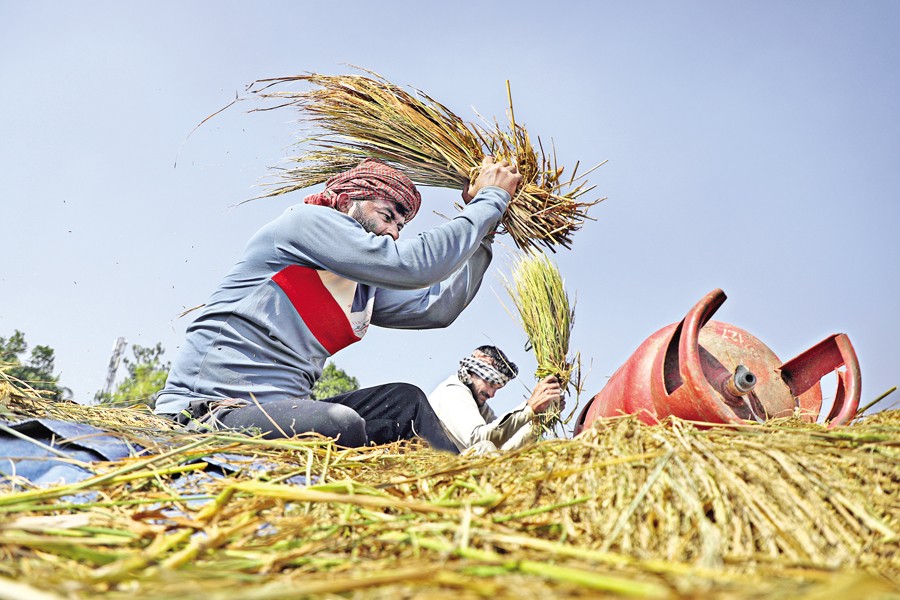Paddy prices slightly lower as import continues, millers dominate market
Experts call for immediate restriction on imports

Published :
Updated :

Paddy prices during the ongoing Aman harvest season are slightly lower than last year’s, with farmers and market observers attributing the decline to continued rice imports and the strong presence of millers in the market.
According to the Department of Agricultural Marketing, dry guti swarna paddy is selling for Tk 1,200-1,250 per maund in Nilphamari, Dinajpur, Rangpur, Naogaon, and Rajshahi. Last year, prices stood at Tk 1,300-1,320 per maund.
Finer shampa-katari varieties are trading at Tk 1,500-1,550 per maund in parts of Dinajpur and Nilphamari, a 7.0-8.0 per cent decline from last year.
Imtiaz Kabir Chowdhury, a farmer and trader from Dimla in Nilphamari, said the profit margin on guti swarna paddy is only 1.0-2.0 per cent, meaning many farmers are effectively incurring losses. He said farmers who can store their paddy for two more months may make some profit. "But most farmers are small-scale peasants who need money now for Boro cultivation, so they are forced to sell at these low prices. Ongoing rice imports from India have affected the local market," he added.
Suja Rahman, a farmer from Khansama in Dinajpur, said the government's procurement price of Tk 34 per kg (Tk 1,360 per maund) is attractive, but only fully dried paddy is accepted. "It's not possible for us to deliver fully dried paddy immediately after harvesting," he said.
Hajrat Ali Sahjib, proprietor of Olima Traders in Nilphamari, said, a large quantity of Indian rice enters the country every day, which sells at a much cheaper price of Tk 44-45 per kg. This cheaper Indian rice has caused local paddy prices to fall."
According to the food ministry, the private sector imported 0.45 million tonnes of rice between July and October. Ministry data shows that nearly 2,630 tonnes of imported rice enter the country each day.
Farm economist Prof Golam Hafeez Kennedy said big millers and their allied traders are very active in the market, targeting large volumes of paddy.
"Their agents are already in the field, possibly making strategies to buy at lower prices," he added.
He recommended that the government immediately suspend rice imports for the next two months to help farmers earn a viable return, ensuring their ability to continue rice cultivation next season.
He also noted that Aman paddy prices are even lower in hilly and haor regions and urged the Directorate General of Food to ensure that farmers in those areas can sell their paddy to the government.
The government has announced plans to buy 0.7 million tonnes of rice and paddy this Aman season -- rice at Tk 49-50 per kg and paddy at Tk 34 per kg -- according to the Directorate General of Food.
SM Nazer Hossain, vice-president of the Consumers Association of Bangladesh, said that the decline in paddy prices in rural areas and milling hubs is not reflected in Dhaka and Chattogram retail markets.
"No rice is available below Tk 55 per kg. Medium and fine varieties are selling at Tk 65-90 per kg, and prices have remained almost unchanged for the last month despite the Aman harvest," he said.
Bangladesh is targeting a record 17.8 million tonnes of rice from this year's Aman harvest.
tonmoy.wardad@gmail.com


 For all latest news, follow The Financial Express Google News channel.
For all latest news, follow The Financial Express Google News channel.